Preservation efforts save poached pangolins

When people think of poaching, the image of elephants and rhinoceroses tends to come to mind. But the world’s most trafficked animal, the pangolin, is often left under the radar. The African Pangolin Working Group in South Africa is providing rehabilitation to poached pangolins and staving off extinction.
The group has been working with pangolins for 10 years. The unique animals, poached for their scales, come to the Wildlife Veterinary Hospital in Johannesburg in South Africaafter days or even weeks of being held by poachers or caught in traps. There pangolins are treated and then sent to secret, secure locations to avoid poachers targeting them.
When pangolins feel threatened, their defense is to curl up into a ball. Though effective against natural predators, this makes it easier for poachers to capture them. According to the group’s chairman Raymond Jansen, officials seized 97 tons of pangolin scales from leaving Africa last year, estimating to be 150,000 pangolins poached. Jansen believes that is just 20% of the total figure, and the group is also fighting back.
Most commonly they set up sting operations, posing as fake pangolin buyers, and then arrest those that attempted to sell the animal. They also have a dog that can sniff all four different African pangolin species, and a second dog in training.
Student’s costumes brighten online learning

When schools went online, Zoom seemed to plague everyone with boredom and discouragement. For Logan Houghtelling, a sophomore living in the San Francisco Bay area, the stress was even greater with his father was away fighting fire. To combat the stress seen in the faces of students and teachers, Houghtelling sought to brighten up the online classroom. That’s when he decided to make his webinars a little more interesting by dressing up in different costumes.
Houghtelling switches up his costumes every Wednesday. His costumes include the Phantom of the Opera, Where’s Waldo, a pirate, Homer Simpson, a cowboy and many more. What started out as a small way to bring cheer became something students and teachers looked forward to.
Houghtelling said he’s grateful his costumes bring joy. “I think there need to be people that go out and, you know, bring people happiness,” he told The Associated Press. “More people need to do that. We just need to spread positivity.”
Blind brothers create clothing company to fund research

Blind brothers Bryan and Bradford Manning created a clothing company that sells their products without showing what they are. Two Blind Brothers socks, beanies, sunglasses and super soft shirts are not featured on their website. Instead customers buy the products blind, and the color of the shirt is printed on it in brail. The concept behind the business was to challenge customers if they would buy something blind.
One hundred percent of their revenue goes toward funding for the rare degenerative eye disorder they both have. Since they began the company in 2016 they have raised over $700,000 for preclinical research trials to help cure blindness.
They said the response to their company has been overwhelming and that they are happy their work is contributing to a greater cause. In their mystery boxes they always write a note of appreciation. “When someone shops blind, they prove something remarkable,” they wrote. “They prove that genuine trust is real.”
Website honors COVID deaths with short stories

Jessica Murray wanted those who died due to COVID-19 to be remembered as more than a statistic. After seeing a website that commemorated the lives of those who died in New York, she went right to work creating a website for those who died in St. Louis.
Murray collects information from information she finds from online, obituaries, and news sources. She works at home contributing about four hours a day. Her cockatoo Misha often accompanies her, especially when the working is emotionally tolling. To her the website and Facebook page are a way to bring humanity back into the death toll.
Joyce “Lady J” Huston also runs a similar Facebook page called Black Corona Lives Matter that focuses on the imbalance of cases for minorities and highlights their stories. “It’s tremendously important because you can’t just have numbers. You need to see the faces. You need to hear that these were living people who have lost their lives to a pandemic,” Huston said.
Old phones help Indonesian students get online

An organization in Indonesia is providing lower income students and families with old mobile phones so they can access the internet for online school. Ghina Ghaliya, a journalist for the national newspaper, came up with the idea after a garbage collector asked her for such a request.
Her and 11 other journalists first started the organization to help with food and monetary needs, but after Ghaliya’s conversation with the garbage collector, the group decided to shift their focus to collecting phones. Since the beginning of this month, more than 200 phones have been donated as well as over $53,000. Now many students who did not have access to the Internet or schooling are able to tune in to classes.
Khaissyah Levi, 16, used to use his father’s phone to attend classes. His father would have to work part time to allow Levi to use the phone. Qayran Ruby Al Maghribi would do the same thing, collecting assignments and logging on three times a week on his father’s phone. Many times he would submit assignments late since head to wait for his father to return home from work so he could submit his work.
Now both of these students have personal mobile phones to attend class and submit homework on. “I will use the phone to do online school every day,” Maghribi told The Associated Press.




